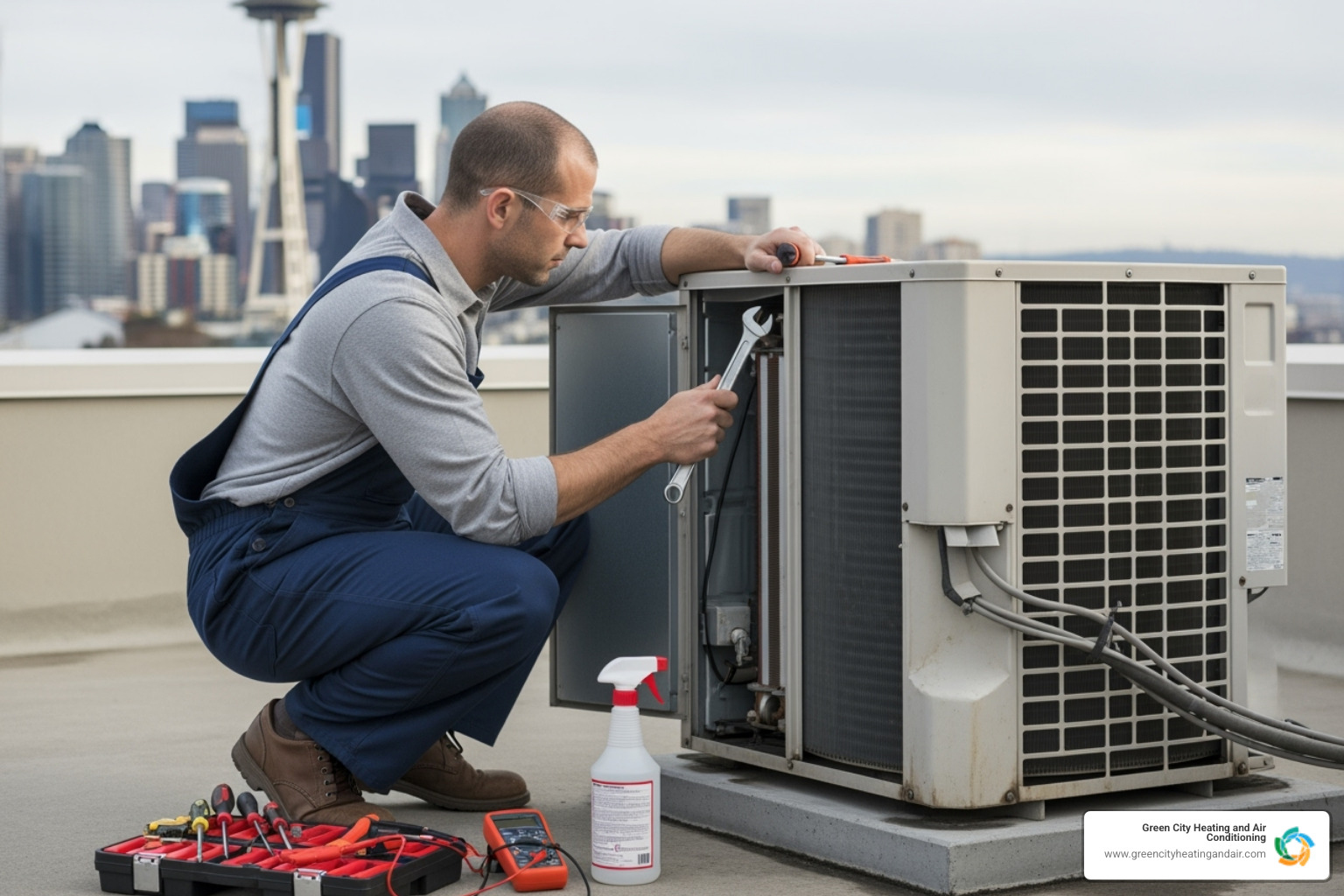Why Your Tacoma's AC Needs an Upgrade
If you're searching for ac system upgrade tacoma options, you're not alone. Many Toyota Tacoma owners struggle with weak cooling, especially in hot climates where temperatures soar above 100°F.
Quick AC upgrade options for your Tacoma:
- Simple fixes: Replace cabin air filter, use recirculation mode, add window tint
- Component upgrades: Install electric cooling fans, upgrade compressor (Delphi/Denso brands)
- Professional repairs: Fix AC clutch issues, replace cracked evaporator core, convert mechanical to electric fans
- Maintenance: Clean condenser fins, check refrigerant levels, clear blocked drain lines
The problem isn't just in your head. Research from Tacoma owner forums reveals a clear pattern: "The AC on my 2002 was fantastic. On the 2015 it seems ok, but not nearly as strong." Many owners report that their trucks only blow cold air when moving, not at idle.
Common Tacoma AC complaints include:
- Weak airflow at idle due to mechanical fan design
- Second-generation models feeling underpowered
- AC clutch failures on newer 2024 models
- Water dripping on driver's side floor from cracked components
Whether you live in scorching Phoenix heat or just want your truck to "BLAAASSSTT icy cold air like a 2003 Chevy work truck," there are proven solutions. Some fixes take five minutes, while others need professional help.
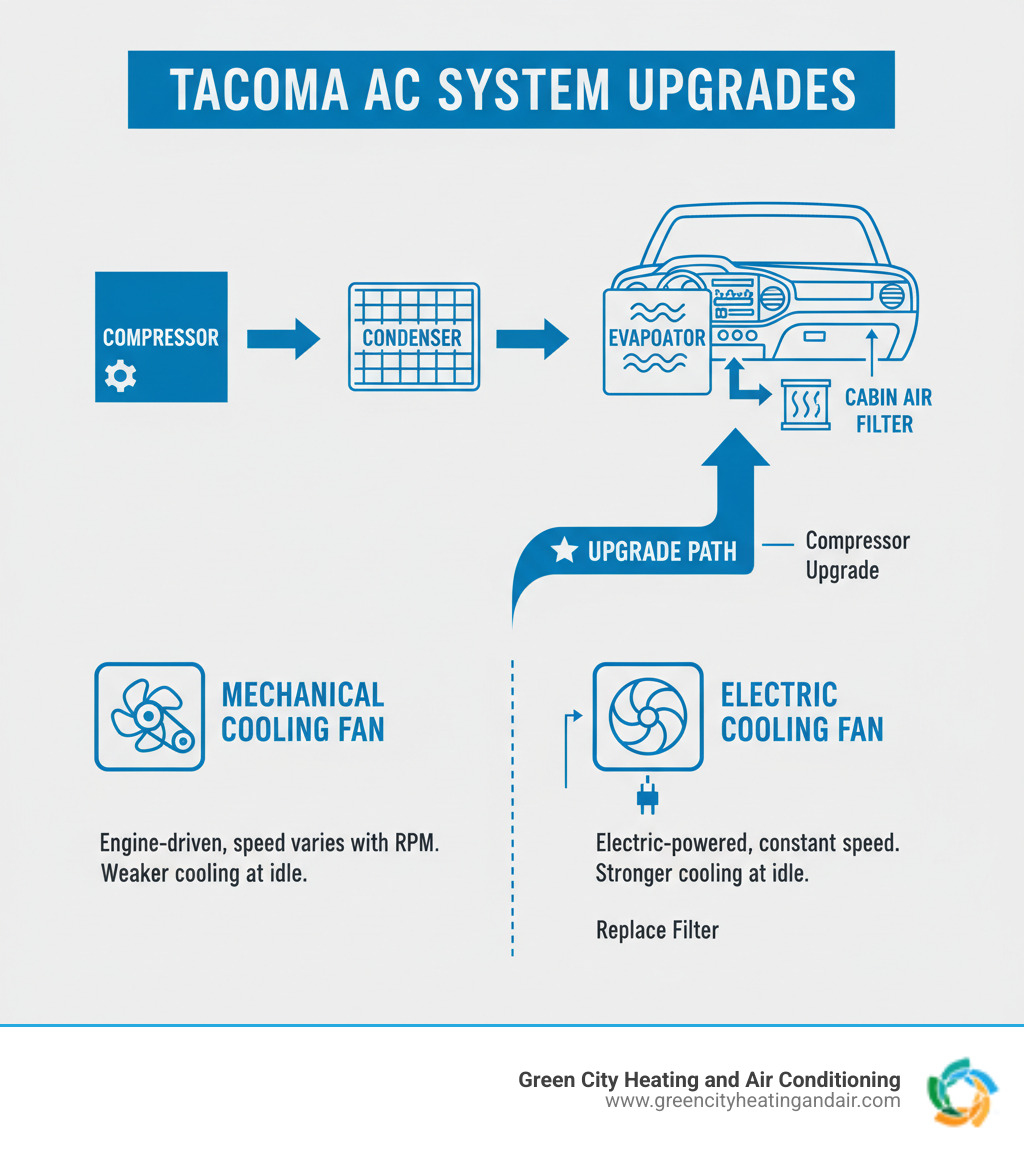
Why Does My Tacoma's AC Feel Underpowered?
If you're sitting in traffic on a hot summer day, sweating while your Tacoma's AC barely whispers cool air, you're experiencing one of the most common complaints among Toyota truck owners. The frustration is real, and honestly, it's not all in your head.
The biggest culprit behind your ac system upgrade tacoma search? Your truck's mechanical fan dependency. Unlike many modern vehicles that use electric fans, most Tacoma generations still rely on a mechanical fan that's tied directly to your engine speed. When you're cruising down the highway, everything works great. But sit at a red light or idle in a drive-through, and suddenly your AC feels about as powerful as a desk fan.
One Tacoma owner put it perfectly: "The problem with the Tacoma A/C is that they only blow their coldest when you're moving. They still have a mechanical fan assembly rather than an electric fan assembly. Which means that instead of the compressor/engine fan running at full tilt all the time because it's powered by electricity, they're dependent on the speed of the engine. So idle = lower speed = lower A/C performance."
Beyond the fan design, you might notice other concerning signs. Water on your floorboards isn't just annoying – it could signal a cracked evaporator core, especially troubling when it happens at just 500 miles like one unlucky new Tacoma owner finded. Strange noises like chirping or screeching often point to compressor clutch issues, which have become particularly problematic in 2024 models.
Speaking of clutch problems, some owners are dealing with repeated failures. You can read what other owners say about A/C clutch failure – one frustrated owner faced three repair attempts in just 2,500 miles! There's also the mysterious compressor cycling issue where your AC runs even when it's supposedly off, creating unwanted cooling and extra wear on your system.
What are common signs of a failing AC system?
Your Tacoma will usually give you plenty of warning before the AC completely gives up. Weak airflow is often the first sign – even with the fan cranked to high, you're getting a gentle breeze instead of that satisfying blast of cold air.
Inconsistent cooling creates those annoying hot spots where some vents blow arctic air while others feel like they're barely trying. If you're hearing chirping or screeching sounds when the AC kicks on, your compressor clutch is likely crying for help. That's become especially common in newer Tacoma generations.
Musty smells from your vents usually mean mold or mildew has set up shop on your evaporator coil, often thanks to a clogged AC drain line. And while a small puddle of clear water under your parked truck is normal condensation, visible leaks of colored fluid or water inside your cabin definitely aren't.
Watch for an AC clutch that won't engage properly – it should spin smoothly when the AC is on, not cycle rapidly on and off like it can't make up its mind.
What are specific issues known to Tacoma models?
Tacoma owners have been comparing notes for years, and some clear patterns have emerged. Many swear that older models felt stronger – and they're not wrong. As one owner noted, "My AC on my 2002 was fantastic. On the 2015 it seems ok, but not nearly as strong." This isn't just nostalgia talking; there seem to be real differences in cooling power across generations.
Weak cooling at idle remains the most consistent complaint across multiple Tacoma generations. That mechanical fan design means your cooling performance is literally tied to how fast your engine is running, which is why highway driving feels great but city traffic becomes miserable.
Compressor failure typically shows up around 70,000 miles, especially after your truck has been stressed by extreme heat or stop-and-go traffic. The original Delphi compressors in 2nd generation Tacomas are generally reliable, but they're not invincible.
The 2024 Tacoma has brought new frustrations with persistent AC clutch issues and climate control glitches where the system runs even when turned off. For owners of brand-new trucks, dealing with repeated AC repairs feels particularly unfair – and expensive.
Can Simple Maintenance Boost My Tacoma's AC Performance?
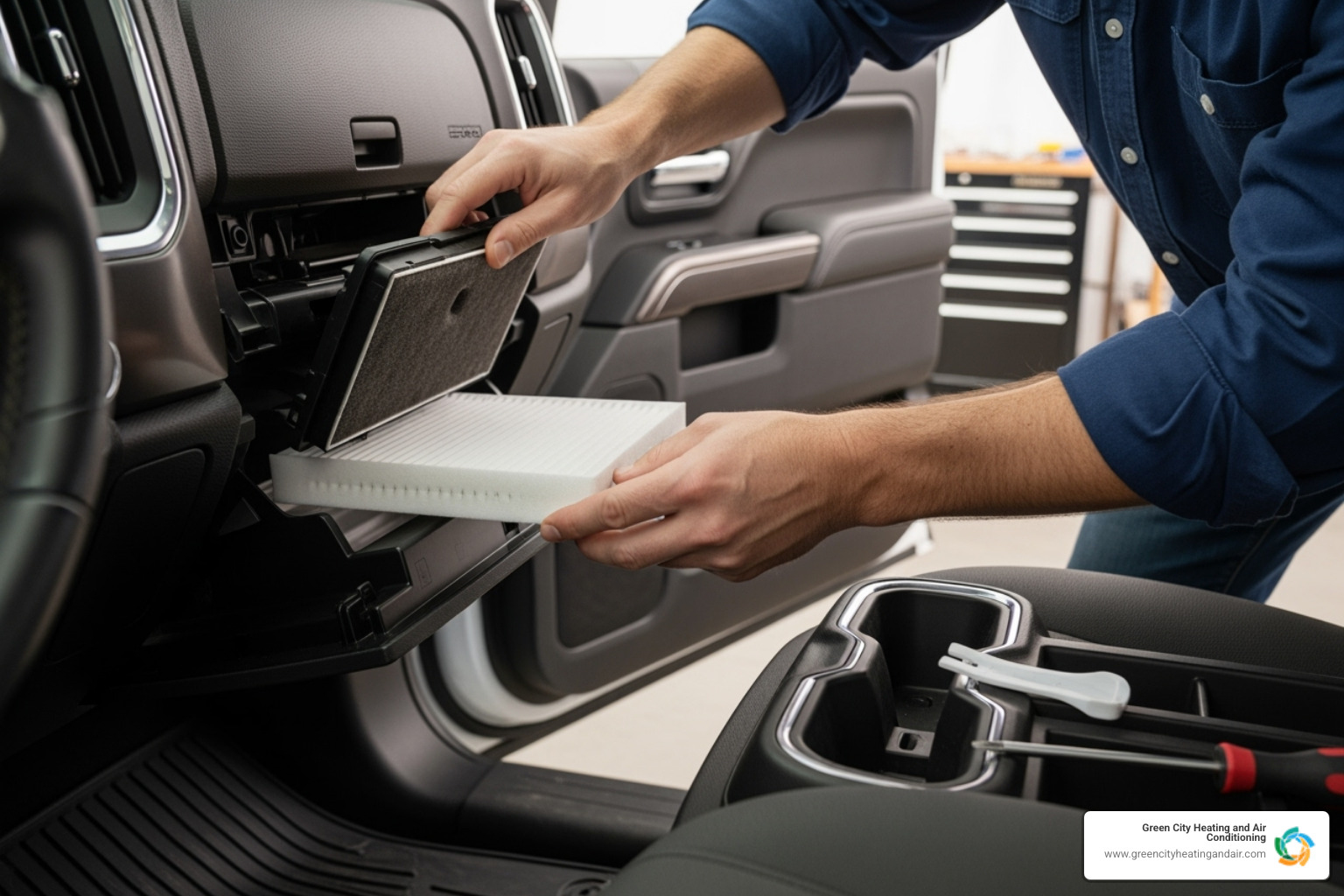
Before you start shopping for an ac system upgrade tacoma, we have some great news: your truck's cooling system might just need a little TLC to get back to peak performance. Many Tacoma owners are surprised to find that what feels like a failing AC system is actually just crying out for some basic maintenance.
We've seen countless cases where a simple cabin air filter replacement or a quick condenser cleaning transformed a sluggish AC into one that blows refreshingly cold air. These aren't just temporary band-aids either – proper maintenance can genuinely restore your system's efficiency and help it run like new.
Think of it this way: your AC system works hard, especially during those scorching summer months. Over time, filters get clogged, condensers collect debris, and refrigerant levels can drop. When these small issues pile up, your once-powerful cooling system starts to wheeze and struggle.
How can I improve cooling without a full upgrade?
The beauty of these maintenance fixes is that most take just minutes and can make an immediate difference in your comfort. Let's start with the game-changer that many Tacoma owners swear by: using "Max AC" or recirculation mode. This setting tells your system to cool the air that's already inside your cabin instead of constantly battling the hot air streaming in from outside. One owner perfectly captured this: "Once it starts blowing cold, turn on the recycle air. It will cool the air that is already getting cooled and get it colder."
Your cabin air filter is another quick win that's often overlooked. When this filter gets clogged with dust, pollen, and debris, it's like trying to breathe through a dirty sock. The air simply can't flow properly, leaving you with weak, disappointing airflow no matter how high you crank the fan.
Don't forget about cleaning debris from your condenser either. This vital component sits right behind your front grille, where it catches every bug, leaf, and bit of road grime that comes its way. When it's covered in crud, it can't release heat effectively, making your whole system work harder for less cooling power. A gentle rinse with your garden hose when the engine is cool can work wonders.
Window tint is an investment that pays dividends every time you get in your truck. High-quality ceramic tint blocks solar heat before it even enters your cabin, giving your AC system a serious head start. As one happy owner put it: "I got my windows tinted with ceramic tint. Best money I ever spent."
Finally, never underestimate the power of a good windshield sun shade. It might look simple, but this humble accessory can drop your interior temperature by 20-30 degrees on a hot day. Less initial heat means your AC reaches that perfect temperature faster and doesn't have to work as hard to maintain it.
Should I try an AC recharge kit?
We get this question a lot, and our answer is always: proceed with caution. Those DIY recharge kits you see at auto parts stores can seem like an easy fix when your AC isn't blowing cold, but they're not always the solution they appear to be.
Here's the thing about low refrigerant – it doesn't just evaporate on its own. If your system is low, there's almost certainly a leak somewhere that needs attention. Simply adding more refrigerant is like putting a band-aid on a leaky pipe; it might help temporarily, but it won't solve the underlying problem.
Using a gauge correctly requires some knowledge and experience. The pressure readings can be tricky to interpret, and factors like ambient temperature and humidity affect the numbers. What looks like the right pressure on a cool morning might be completely wrong on a hot afternoon.
The biggest risk we see with DIY recharging is overcharging. Too much refrigerant can actually make your system perform worse, not better. It increases system pressure, reduces cooling efficiency, and can even damage your compressor – turning a simple maintenance issue into an expensive repair.
There are also environmental concerns to consider. Refrigerants are potent greenhouse gases that need to be handled properly. Professional technicians have the equipment to recover and recycle refrigerant safely, while DIY attempts often result in harmful chemicals being released into the atmosphere.
If you suspect low refrigerant, we recommend having a professional diagnose the system first. They can find and fix any leaks before properly recharging your system, giving you a lasting solution instead of a temporary patch.
What Are the Most Effective AC System Upgrades for a Tacoma?
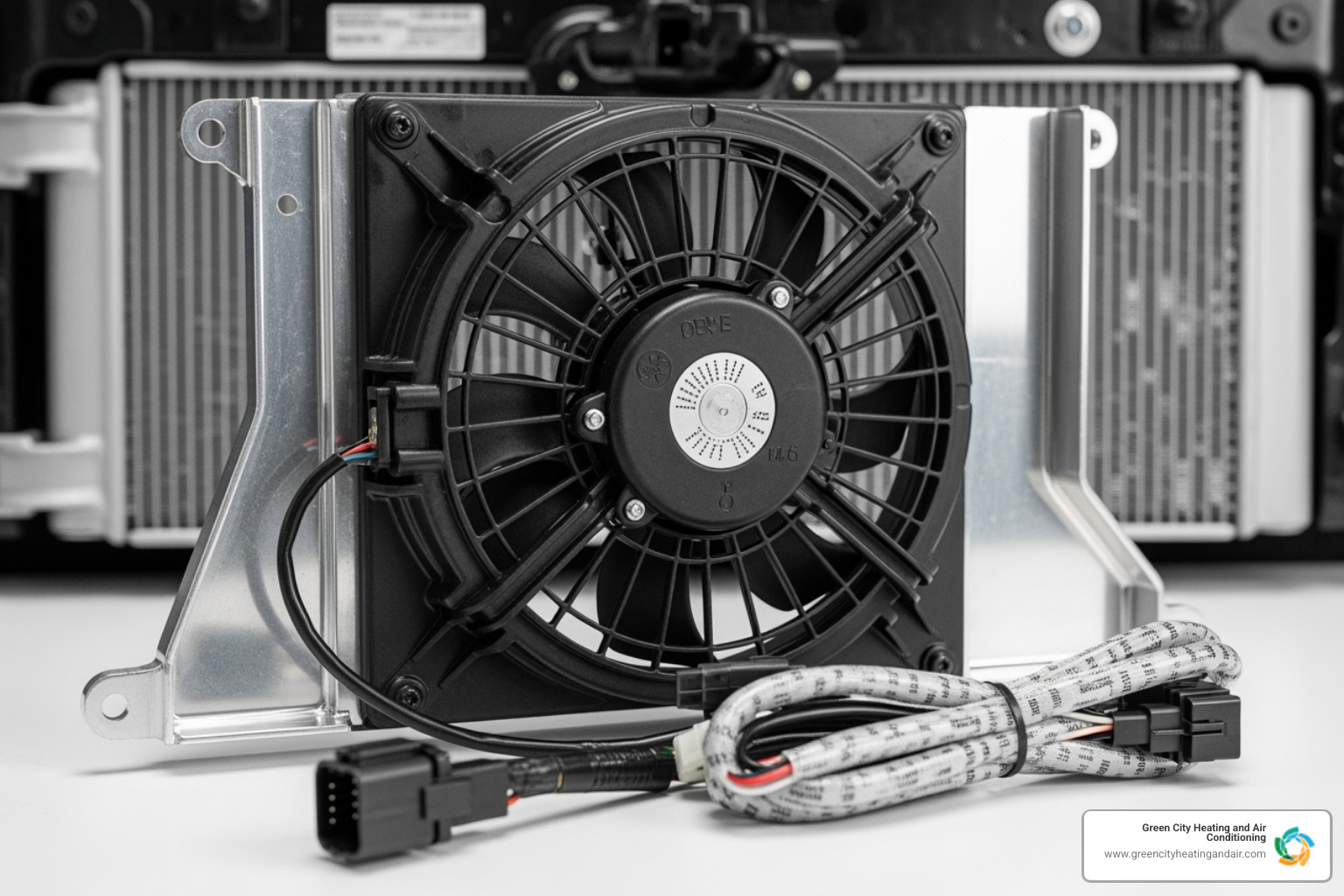
When basic maintenance leaves you still sweating in traffic, it's time to consider a serious ac system upgrade tacoma. We've seen countless truck owners transform their driving experience from miserable to comfortable with the right component upgrades. These aren't band-aid fixes – they're long-term solutions that address the root causes of poor AC performance.
The beauty of upgrading your Tacoma's AC system is that you're not just throwing money at a problem. You're investing in consistent, powerful cooling that works whether you're idling at a drive-through or cruising down the interstate. After years of helping homeowners stay comfortable, we understand how important reliable cooling is for your daily comfort.
What are the best component upgrades for an ac system upgrade tacoma?
The most impactful upgrade for many Tacoma owners is converting from mechanical to electric fan. This single change solves the biggest complaint we hear: weak cooling at idle. Your mechanical fan depends entirely on engine speed, which means slow engine equals slow fan equals warm air. An electric fan runs at full speed whenever your AC is on, giving you that blast of cold air even when you're stuck in stop-and-go traffic.
An upgraded compressor using quality Delphi or Denso brands can breathe new life into a struggling system. The original compressor in many Tacomas was Delphi, and both Delphi and Denso have earned excellent reputations for reliability. Interestingly, many Denso aftermarket compressors are actually Delphi units with different labels, which speaks to the quality of both brands. As one experienced Tacoma owner wisely noted, "Going cheap on an AC compressor can lead to a very expensive nightmare." You can see recommendations for replacement AC compressors from other owners who've been through this process.
A larger aftermarket condenser gives your system more surface area to dissipate heat. Think of it like upgrading from a small radiator to a larger one – more cooling capacity means better performance, especially during those scorching summer months when your AC is working overtime.
What other modifications help keep the cabin cool?
Sometimes the best AC upgrade is preventing heat from entering your truck in the first place. High-quality ceramic window tint does far more than just darken your windows. This specialized tint blocks a significant percentage of solar heat and UV rays without interfering with your phone or GPS signals. Less heat coming in means your AC doesn't have to work as hard to keep you comfortable.
Insulated windshield sun shades might seem simple, but they're incredibly effective at keeping your dashboard and steering wheel from becoming scalding hot. We're talking about the heavy-duty, reflective kind – not those flimsy cardboard versions. Phoenix Tacoma owners consider these essential equipment, and for good reason.
For the ultimate in convenience, installing a remote start system lets you pre-cool your vehicle before you even step outside. Picture this: you're finishing up at the grocery store on a 100-degree day, and instead of climbing into a furnace, you start your truck from inside the air-conditioned store. By the time you reach your Tacoma, it's already cool and comfortable. It's like having a personal assistant for your comfort.
DIY vs. Professional Installation: What's Right for Your Tacoma AC Upgrade?
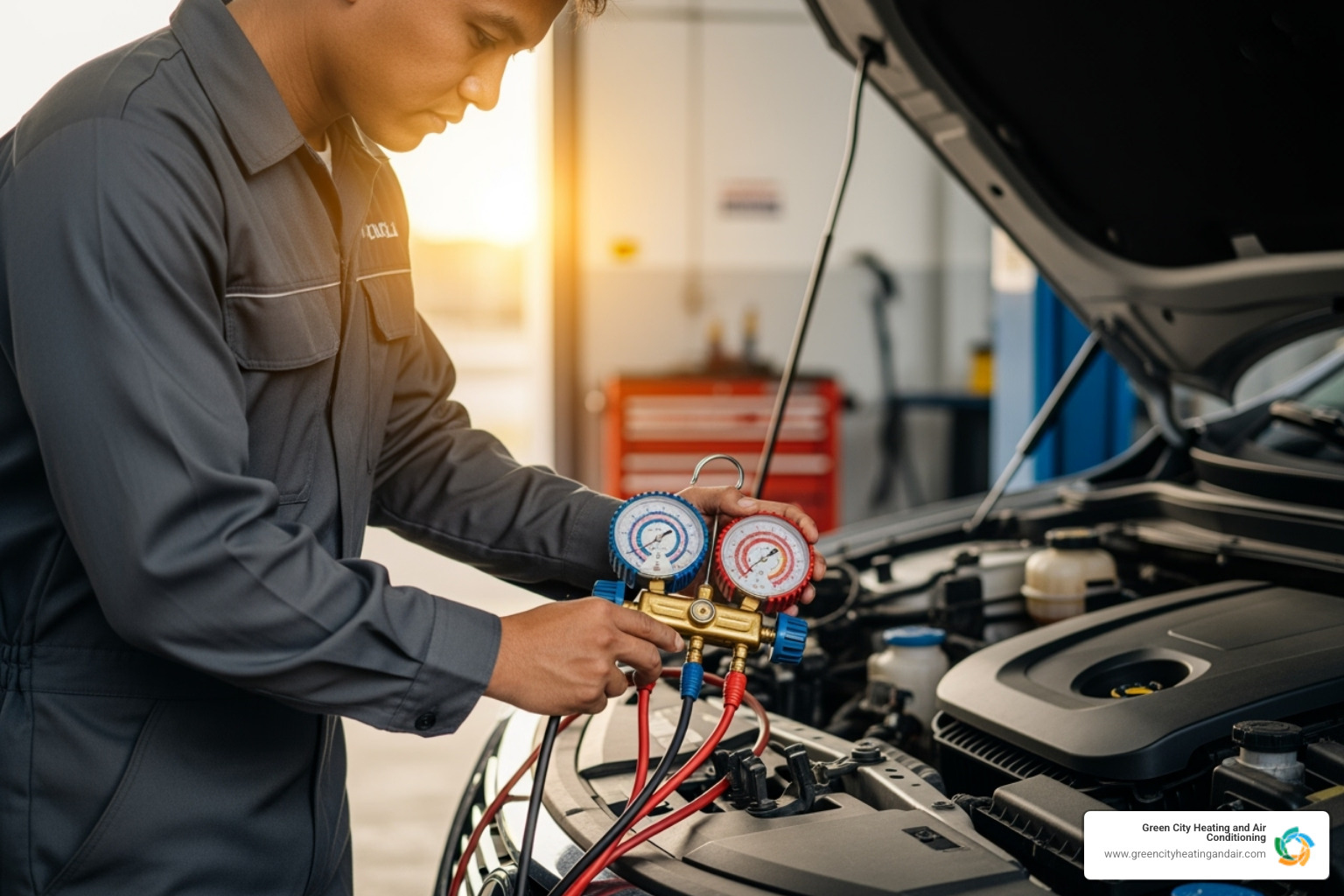
When it comes to an ac system upgrade tacoma, the line between DIY and professional work can feel blurry. We get it – there's satisfaction in fixing things yourself, plus the potential savings. But AC systems are complex beasts that involve refrigerants, electrical components, and precise measurements. Making the wrong call could leave you sweating in traffic with a broken system and a much bigger bill.
The truth is, some AC tasks are perfect weekend projects, while others require the kind of specialized tools and expertise that only come with years of experience. At Green City Heating and Air Conditioning, we've seen plenty of well-intentioned DIY attempts that ended up needing professional rescue. We're always happy to help, but we'd rather save you the headache in the first place.
Which AC tasks can I do myself?
If you're handy with basic tools and comfortable following instructions, there are several AC-related tasks that can make a real difference in your Tacoma's cooling performance.
Replacing the cabin air filter is probably the easiest win you'll ever get. Most Tacoma owners can swap this out in under ten minutes by popping open the glove box and sliding in a new filter. It's amazing how much better your airflow feels with a fresh filter – especially if the old one looks like it caught every leaf between Seattle and Spokane.
Cleaning the condenser is another straightforward job that pays dividends. Once your engine is completely cool, you can gently brush away debris and rinse the condenser fins with a soft spray of water. Just imagine trying to breathe through a screen door covered in dust – that's what your condenser deals with when it's clogged.
For the more adventurous DIYer, carefully using a refrigerant recharge kit might seem tempting. These kits come with gauges and instructions, and if you follow them precisely, you might see some improvement. However, low refrigerant usually means there's a leak somewhere. You're essentially putting a band-aid on the problem, and there's always the risk of overcharging the system.
Installing sun shades and vent shades requires nothing more than common sense and maybe a screwdriver. These simple accessories can dramatically reduce the heat load on your AC system, making your truck's job much easier on those scorching summer days.
When should I call a professional for my ac system upgrade tacoma?
Here's where things get serious, and frankly, where we see most DIY attempts go sideways. Some AC jobs require specialized equipment, refrigerant handling licenses, and years of experience to do safely and correctly.
Compressor replacement is the big one that brings most folks to our shop. This isn't just swapping out a part – it involves evacuating all the old refrigerant, installing the new compressor with the correct amount of oil, then properly evacuating and recharging the entire system. Get any of these steps wrong, and your shiny new compressor could fail immediately or damage other expensive components.
Electric fan conversion might look straightforward, but it involves precise electrical work, custom mounting, and often integration with your truck's computer systems. We've seen DIY fan installations that worked great until they caused overheating issues or electrical problems months later.
The technical stuff like evacuating and recharging the system requires manifold gauges, vacuum pumps, and refrigerant recovery equipment that most homeowners don't have lying around. More importantly, it requires knowing exactly how much refrigerant and oil your specific system needs. Too little and it won't cool properly; too much and you can damage the compressor.
Diagnosing electrical faults is where our experience really shows. When your AC isn't working because of a faulty sensor, relay, or mysterious wiring gremlin, our technicians have the diagnostic tools and know-how to track down the problem without replacing parts randomly.
If you're dealing with refrigerant leaks, that's definitely professional territory. Finding a tiny leak in your evaporator or condenser requires specialized detection equipment, and the repairs often involve major disassembly of your dashboard or front end.
For comprehensive and reliable ac system upgrade tacoma services, our licensed technicians at Green City Heating and Air Conditioning are ready to help. We've got over 30 years of experience keeping folks cool in King, Pierce, and Snohomish Counties. You can learn about professional installation services our team provides – because sometimes it's worth letting the pros handle the heavy lifting while you enjoy that perfectly chilled cab.
What Are the Long-Term Pros and Cons of Upgrading?
Investing in an ac system upgrade tacoma comes with significant long-term benefits, but we want you to have the complete picture before making your decision. Your local climate plays a huge role in determining how much value you'll get from an upgrade, and there are definitely some considerations to keep in mind.
What are the main benefits of an upgraded AC system?
When you upgrade your Tacoma's AC system, you're not just getting colder air - you're changing your entire driving experience. The most obvious benefit is powerful, consistent cooling that delivers truly icy cold air even when you're sitting in traffic. No more waiting for your truck to start moving before the AC kicks in properly.
Faster cool-down times mean you'll reach your desired temperature much more quickly. Instead of enduring that initial blast of hot air while your system struggles to catch up, an upgraded system gets to work immediately. This makes a huge difference when you're jumping into a truck that's been baking in the sun all day.
Converting to an electric fan system provides reduced strain on the engine by eliminating the parasitic drag that mechanical fans create. This can lead to minor improvements in fuel efficiency and helps your engine run more smoothly overall.
For anyone dealing with extreme heat - whether you're in the scorching temperatures of Phoenix or facing an unexpectedly hot summer day here in the Pacific Northwest - improved comfort in extreme heat becomes invaluable. You'll finally have that system that can "BLAAASSSTT icy cold air" when you need it most.
There's also the potential for higher vehicle resale value. A well-maintained, efficiently cooling AC system is a significant selling point, especially in regions with warm climates. Future buyers will appreciate stepping into a truck that immediately feels comfortable.
Are there any drawbacks or climate considerations?
While the benefits are compelling, we believe in giving you the full story. Installation complexity is the biggest consideration for major AC upgrades. Components like compressor replacement or electric fan conversion aren't simple weekend projects - they require technical expertise, specialized tools, and careful handling of refrigerants.
The importance of proper installation cannot be overstated. A poorly executed upgrade can lead to leaks, electrical issues, or even catastrophic component failure. This is exactly why we recommend working with experienced professionals who understand these systems inside and out.
Your location makes a huge difference in determining upgrade priorities. In places like Houston or Phoenix, where temperatures regularly exceed 100 degrees, an AC upgrade becomes almost essential for daily comfort. As one frustrated owner put it, "I live in one of the most miserably hot places in the USA and a little AC upgrade during the summertime would be much appreciated."
Here in the Pacific Northwest, our summer temperatures typically reach the upper 80s and low 90s, so the urgency might not feel as critical. However, even in our milder climate, improved AC performance translates directly to better comfort and a more enjoyable driving experience. When those occasional heatwaves hit, or when you're heading out to sunnier destinations, you'll be grateful for consistent, powerful cooling that's ready for whatever the weather brings.
The key is understanding that climate considerations should guide your decision-making process. While everyone deserves comfortable transportation, the level of upgrade needed varies significantly between Canada's cooler temperatures and the desert heat of Arizona.
Stay Cool on the Road and at Home
Whether your Toyota Tacoma just needs fresh cabin air filter or a complete ac system upgrade tacoma, we hope this guide has given you the roadmap to better cooling. The journey from a struggling AC system to one that delivers that satisfying blast of icy air doesn't have to be overwhelming.
Simple maintenance like using recirculation mode and cleaning your condenser can work wonders for many trucks. But when you're ready for major upgrades like converting to electric fans or installing a high-quality Delphi compressor, that's where the real change happens. Your Tacoma can go from barely keeping up in Phoenix heat to delivering consistent, powerful cooling even when you're stuck in traffic.
We've seen how some tasks are perfect for weekend warriors who enjoy getting their hands dirty. Swapping that cabin air filter or adding quality window tint are satisfying DIY wins. But when it comes to the complex stuff—compressor replacement, electric fan conversions, or properly evacuating and recharging your system—that's when you want experienced professionals handling your investment.
Vehicle comfort shouldn't end when you park in your driveway. Just as we've helped you understand how to keep your Tacoma cool on those scorching summer drives, your home comfort deserves the same attention to detail. Here in King, Pierce, and Snohomish Counties, we know how those unexpected heat waves can turn your living room into an oven just as quickly as they can overwhelm your truck's AC.
Our local, family-owned business brings the same expertise we've discussed for vehicle AC systems to your home's cooling needs. We never subcontract because we believe your comfort—whether on the road or relaxing at home—deserves our personal attention and over 30 years of experience.
When your home needs that same reliable, powerful cooling you're working toward in your Tacoma, ensure your home stays as cool as your truck with our expert services. Because whether you're cruising down I-5 or settling in for a movie night, staying cool shouldn't be a struggle.
More Blogs
Latest
insights and tips
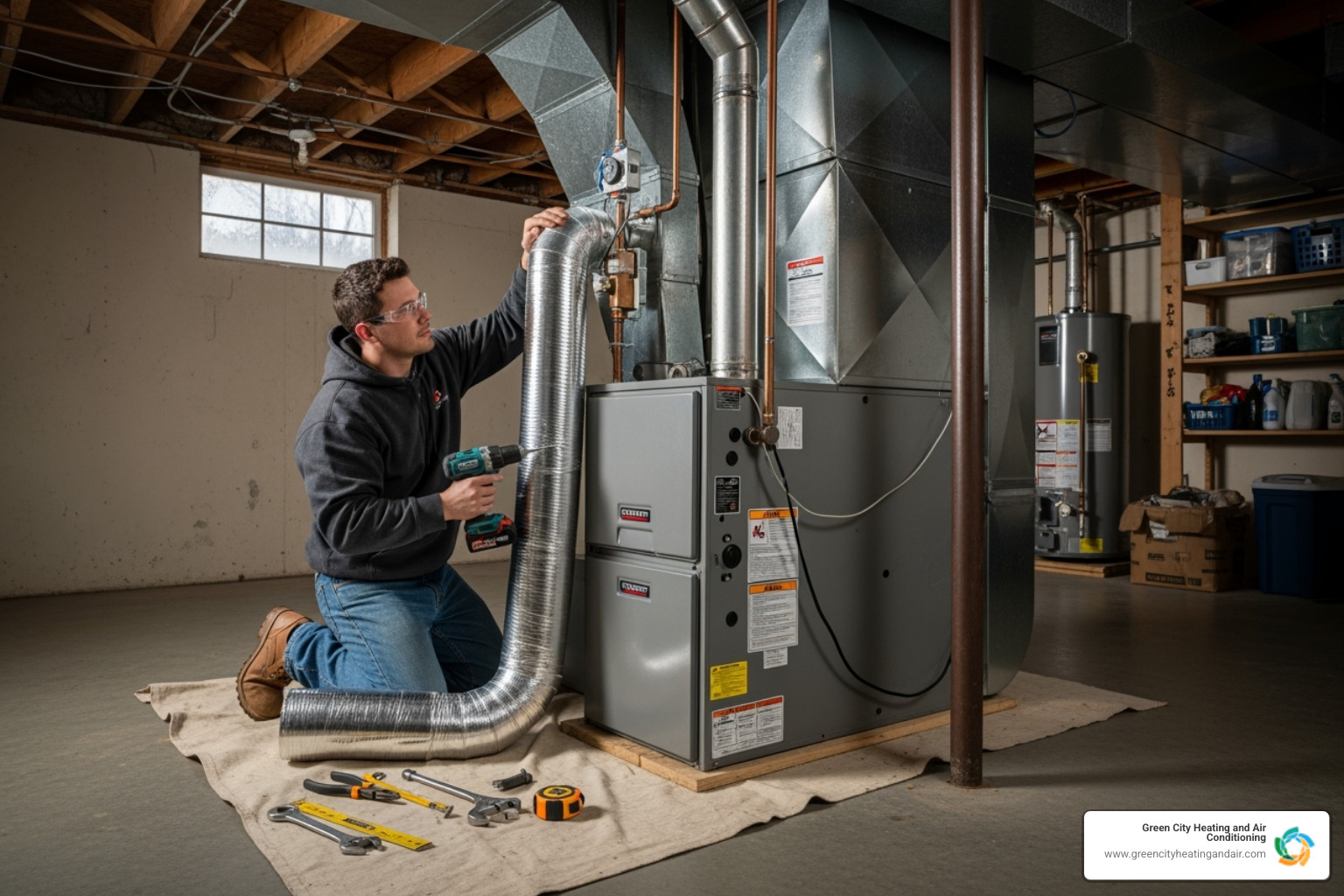
Warmth Unleashed: The Ultimate Seattle Furnace Installation Handbook
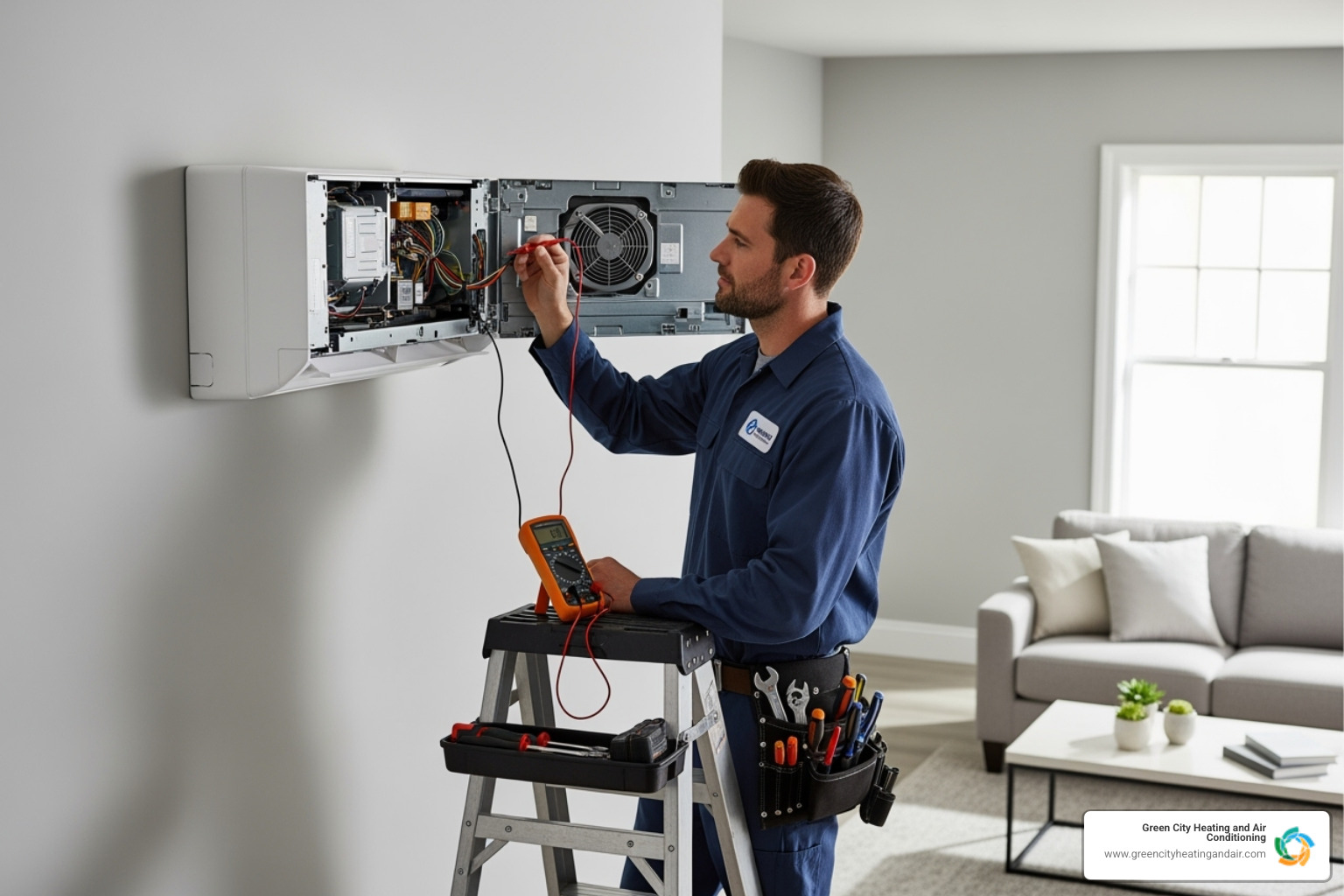
Emergency Ductless AC Repair in Bellevue: Get Your Cool Back Fast
